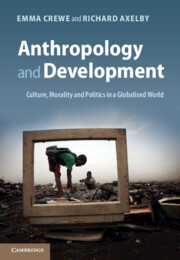Book contents
- Frontmatter
- Contents
- List of acronyms
- Preface and acknowledgements
- 1 Introduction
- 2 Anthropologists engaged
- 3 The social and political organisation of aid and development
- 4 The elusive poor
- 5 Human rights and cultural fantasies
- 6 Hierarchies of knowledge
- 7 The moralities of production and exchange
- 8 The politics of policy and practice
- 9 Imagining the future
- Appendix: challenging questions arising from this book
- Notes
- References
- Index
3 - The social and political organisation of aid and development
Published online by Cambridge University Press: 05 November 2012
- Frontmatter
- Contents
- List of acronyms
- Preface and acknowledgements
- 1 Introduction
- 2 Anthropologists engaged
- 3 The social and political organisation of aid and development
- 4 The elusive poor
- 5 Human rights and cultural fantasies
- 6 Hierarchies of knowledge
- 7 The moralities of production and exchange
- 8 The politics of policy and practice
- 9 Imagining the future
- Appendix: challenging questions arising from this book
- Notes
- References
- Index
Summary
Key points covered by this chapter
This chapter outlines the shape of Development World through the labelling of the people and places within it. We explain what anthropologists find problematic in geographical classification of development.
We introduce the key state and government categories – governments giving aid, states receiving aid and global intergovernmental agencies.
We describe the non-state actors within the categories of the private sector, civil society and constituent groups (beneficiaries, activists and development professionals).
The changing governance and architecture of aid is discussed. States are being displaced by both NGOs and global intergovernmental agencies and aid is being globalised.
Finally institutional global partnerships are explored, particularly between international and national NGOs, through the lens of race and nationality.
How big is the world of aid? A crude measurement of the scale might consider how much money is involved. But such measures raise further questions about what exactly should be classified as aid money, what should be included and what should not. According to the World Bank all aid amounted to $457 billion in 2007, $294 billion in 2008 and $390 billion in 2009. But these figures include debt relief. They also seem rather small when compared to the cost of the Iraq war at $500 billion. Remittances are almost as big as aid; in 2009 $319 billion of remittances were sent to the ‘developing’ world. Although OECD member countries pledged to spend 0.7% on aid, only Sweden, Norway, Luxembourg, Denmark and the Netherlands had achieved this by 2009. The amount of aid received per head ranges from $1 in Brazil to $12,923 in Niue (a small island country in the South Pacific), while the percentage of Gross National Income that is aid spans 50% for Burundi to less than 1% for South Africa. In 2009 the Bill and Melina Gates Foundation gave $2.5 billion to global causes while the Ford Foundation disbursed $490 million. Most foundations, trusts, companies or individuals give far smaller amounts but the vast number of donors means that large sums are raised. The American Red Cross spends over $3,422 million, while Food for the Poor £1,516 million and World Vision $1,206 million. Save the Children’s income was $1,276 million in 2008, 31% of which came from individuals. ActionAid alone has 320,000 supporters in Europe.
- Type
- Chapter
- Information
- Anthropology and DevelopmentCulture, Morality and Politics in a Globalised World, pp. 46 - 87Publisher: Cambridge University PressPrint publication year: 2012



